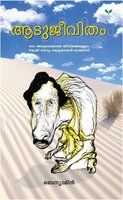There hadn't been many novel that caught the readers attention in the recent years as this one. Many have been recommending this to me over the last one year. It is only now, that I could get hold of a copy. This book was again in news after it won the prestigious Kerala Sahitya Academy Award.
Fictional account of a real life story of Najeeb, one of the millions of Keralites in the Middle East. Like many , Najeeb was also offered a Visa to go to the Gulf by one of his friends relatives. The relatively large sum of 30000 was managed with the help of well wishers and friends, and he reach Saudi Arabia, leaving behind his anytime expecting wife and mother. Hakeem, a young boy from nearby town to his company. The wait at the airport was long, and the Arbab ( his sponsor) did not turn up at the arrival terminal. The wait was long, until they saw an old, almost into pieces, truck arrive and the driver jumps out. They were put behind the open truck, without any communication and drove out of the city and the crowd into the wilderness of sand.
In the midst of the desert with no visible places of habitat, they were dropped at two separate places. It was night and the stench coming out of the place was unbearable. The rest is one very disturbing tale of survival. Forced to look after goats and camels, with near nothing to eat and no proper accommodation, The only other human, who was at the place while when he arrived, went missing the next day ( it was much later, he discovers the bones and torn dresses buried in the desert). With one days experience of managing the herd, Najeeb starts his eventful life with the Animals to communicate. There was no other human in the vicinity and the only contact wih the outside world was limited to the weekly truck that arrive with fodder and water. Najeeb endures the place, the beating with the belt, the often uncontrollable animals. The rare hopes of escape was ruthlessly crushed by the Arbab. The servile life continued more than 3 years ( there is no count of days and months in desert) until he was rescued by travelling Arab who brought him to the city.
While the incidents are real, Benyamin asserts that he morphed himself with the real Najeeb while writing. The sequence stay to the truth, but a fiction can not be a biographical essay. To his credit, Benyamin, does this job brilliantly creating a beautiful novel.
The narration is simple and very ordinary. It does stay to the emotional and sentimental side of the readers. There is a detached style of writing, with the humour of a defeatist. He is able to look at things with such an open mind with no regret or anger. The structure, language and method is not something that of a masterly work , however the novel connects with the readers at very personal level. One of the better Malayalam novels I read in the recent past.
---------------------------------------------------------Aatujeevitham ( 2008)
Benyamin
Green Books
212 Pages
Rs 130/-
-----------------------------------------------------------
Other reviews : webmalayalee



